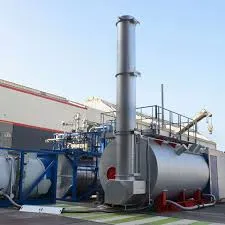
Nov . 08, 2024 06:11 Back to list
Thermal Fluid Heater Systems for Efficient Heat Transfer Solutions in Industrial Applications
The Role of Thermic Fluid Oil Boilers in Industrial Heating
Thermic fluid oil boilers have emerged as a critical component in various industrial heating processes. As industries strive for efficiency and sustainability, these boilers offer an ideal solution to meet high-temperature heating requirements. This article delves into the workings, advantages, applications, and future trends surrounding thermic fluid oil boilers.
Understanding Thermic Fluid Oil Boilers
Thermic fluid oil boilers are specialized heating systems that use thermal oils to transfer heat from the boiler to various industrial processes. Unlike traditional water boilers that generate steam, thermic fluid boilers operate by circulating thermal oils—usually synthetic hydrocarbons or organic fluids—that can withstand high temperatures without vaporizing. This allows industries to achieve higher thermal efficiency with less energy consumption.
The fundamental operating principle involves heating the thermal fluid inside the boiler until it reaches the desired temperature. The hot thermic oil is then circulated through heat exchangers, where it transfers heat to the process equipment. This method not only enhances efficiency but also minimizes thermal losses, making it a popular choice for industries requiring consistent and controlled heating.
Advantages of Thermic Fluid Oil Boilers
1. High Efficiency Thermic fluid boilers can operate at temperatures of up to 400°C (752°F), which makes them an efficient solution for processes that require high heat without the risk of pressure build-up common in steam systems.
2. Energy Savings These boilers provide significant energy savings due to their ability to maintain optimal operating temperatures and reduced thermal losses. Additionally, the heat transfer capacity of thermal oils minimizes the energy required for heating.
3. Safety and Reliability The operation of thermic fluid oil boilers involves lower pressure compared to steam boilers, which reduces the risk of explosive failures. Additionally, modern designs incorporate advanced safety features to ensure reliable performance.
4. Versatility Thermic fluid oil boilers can be utilized in various applications, including chemical processing, food production, textile manufacturing, and more. Their ability to maintain consistent temperatures makes them suitable for diverse industrial needs.
thermic fluid oil boiler

5. Reduced Maintenance Since thermal oils do not convert into steam, the systems have fewer components that can fail or require regular maintenance, leading to lower operational costs over time.
Applications in Industry
Thermic fluid oil boilers find applications in numerous industries. In the chemical sector, they are crucial for reactions that require precise heating. The food industry employs these boilers for maintaining optimal temperatures during cooking and processing. Textile manufacturers rely on thermic fluid boilers for dyeing processes, where consistent heat is vital for quality control.
Moreover, industries that require drying processes—such as paper and wood processing—benefit immensely from the efficient heating solutions provided by these boilers. Additionally, the renewable energy sector is beginning to explore thermic fluid systems in solar thermal applications, where they can be used to store and transfer heat generated from solar collectors.
Future Trends
As industries continue to prioritize energy efficiency and sustainability, the demand for thermic fluid oil boilers is expected to rise. Technological advancements are leading to the development of eco-friendly thermal oils and systems that further enhance energy efficiency. Research and development are also focusing on improving the materials used in the construction of these boilers to withstand higher temperatures and improve longevity.
Furthermore, integration with smart technologies is set to revolutionize the operation of thermic fluid systems. IoT-enabled monitoring and control systems can optimize performance, predict maintenance needs, and reduce energy consumption, creating a more sustainable approach to industrial heating.
Conclusion
Thermic fluid oil boilers represent a pivotal element in modern industrial heating. Their ability to deliver high efficiencies, safety, and versatility makes them indispensable across various sectors. As the push for sustainability intensifies, these boilers are likely to evolve, incorporating advanced technologies that enhance their performance and environmental friendliness. Industries that invest in thermic fluid systems today position themselves for a competitive edge in the future, aligning with global efforts towards energy efficiency and sustainability.
-
High Efficiency Gas Fired Thermal Oil Boiler for Industrial Heating
NewsJul.29,2025
-
High-Efficiency Gas Fired Hot Water Boiler for Sale – Reliable & Affordable
NewsJul.29,2025
-
High Efficiency Biomass Fired Hot Water Boiler for Industrial and Commercial Use
NewsJul.29,2025
-
High-Efficiency Biomass Fired Hot Water Boiler for Industrial Use
NewsJul.28,2025
-
High Efficiency Coal Fired Hot Water Boiler for Reliable Heating
NewsJul.28,2025
-
High Efficiency Coal Fired Thermal Oil Boiler for Industrial Heating
NewsJul.26,2025
Related PRODUCTS






















